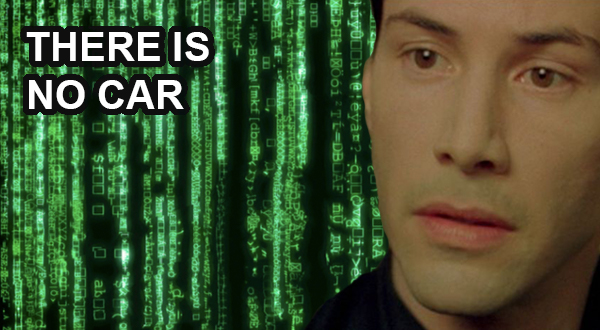In the middle of the Great Mall in Milpitas, California, a shiny, brand-new, blue 2018 Acura TLX (MSRP $33k) sits ready for the taking.
Surrounding the vehicle are 10 screens, where mall-goers can enter their personal data — full name, phone number, income, credit card type — for a chance to win the “grand prize.” In the course of an hour on a Wednesday afternoon, 22 hopefuls fill out the digital form.
In a few weeks’ time, they’ll all be bombarded with the same scammy call: “Congratulations! Your name was recently drawn! All you have to do is come down to [X] and attend a presentation to claim your prize.”
Who runs these sweepstakes? What do they do with our information? Does anyone ever win the damn car?
These seemingly simple questions led me down a vortex of shady marketing tactics, timeshare salesmen, and third-party resale markets — and exposed the dirty underbelly of how our information is brokered.
The company behind the curtain
First thing’s first: the mall isn’t behind these giveaways; they merely rent out the advertising space (for around $1.5k per day). And as it turns out, their partnership standards are pretty low.
After 4 calls to the Great Mall, a receptionist finally relinquishes the name of the firm running the car giveaway: Great Destinations — a timeshare vacation rental company based in Orange County, California.

A giveaway at the Great Mall in Silicon Valley strongly implies that the prize is a 2018 Acura TLX (The Hustle)
I call them up and a guy named Patrick answers. When I ask for the odds of winning the car, he turns hostile:
Patrick: “What’s your name?”
Zack: “Zack.”
Patrick: “Last name?”
Zack: “Why do you need my last—”
Patrick: “Last name, or I can’t do anything for you.”
Zack: “Okay, but—”
Patrick: “Don’t play me, okay? Thank you!” [Abruptly hangs up]
So, I pass the torch to our managing editor, Lindsey, who sets up an untraceable number and calls under the alias “Katie Sanders.”
Patrick collects a rolodex of her (fake) data — full name, age, marital status — then tells her she has to be at least 28 to enter the drawing. “Tell your parent to call me,” he says, and hangs up.
Her “dad” (our writer, Conor) gives it one last try. Patrick tells Conor that in order to win the car, he has to go to a local Great Destinations office and attend a 90-minute timeshare presentation. For good measure, he offers to throw in a “free vacation package to Disneyland.”
“But what about the car? Does anyone ever win it?” asks Conor.
“Not yet!” replies Patrick. “You’re probably the one! We’re waiting for you!”
The fine print tells a different story
In the legal disclaimer of the car giveaway, there’s a statement that contradicts Patrick’s sales bravado:

“Any vehicle, boat or other representation displayed are examples only,” reads the terms of service on a car giveaway (The Hustle)
The car is a loaner from local dealer, Acura of Fremont — and despite what the sweepstakes’ marketing may suggest, it’s not up for grabs. (We called the dealer and they confirmed that the vehicle on display isn’t part of the giveaway at all.)
What you’re really signing up for is the opportunity to win an opportunity to possibly win a small amount of taxable cash.
Here’s what actually happens: 1) You enter the sweepstakes; 2) You have to attend a 90-minute timeshare presentation; 3) You get a scratch-off lotto ticket; 4) If you’re a “grand prize winner,” you get to play a game for a chance to win $100k.
The “game” is that the finalist gets to open 4 “mystery envelopes” with random amounts of cash. Last year’s two “big winners” walked away with checks for $575 and $700 — about enough to buy one side view mirror for your Acura..
That’s the absolute best-case scenario of entering one of these contests. Other aren’t so lucky.
Days after entering to win the car, Maggie Nicholson received a call informing her that her name was drawn. After sitting through a 2-hour timeshare presentation with Boiler Room-like sales tactics, she was told there was no car — but she was eligible for a vacation package.
“[When I declined], they proceeded to tell our 12 year old daughter, ‘I guess your parents won’t take you on your dream vacation!’” she says. Then, they handed over her “prize:” a $25 restaurant voucher that required a $100 minimum spend to redeem.

The car is just a dangling carrot to get your data, n00bs (The Hustle)
In short, nobody wins the car in these telemarketing schemes.
There are other types of car giveaways run by more legitimate parties (charity raffles, event promotions) that do deliver the goods — but if you win, you’re liable to pay a hefty gift tax.
In one instance, a man who won a 2015 Tesla Model S at a casino would have had to pony up $38k in fees to take it home, and ended up selling it instead. He walked away with less than $25k on a $92k vehicle.
It’s a marketing gimmick to get your information
To enter a car contest at the mall, you have to enter a sweeping range of your personal information:
- Mobile number
- Full name
- Marital Status
- Age
- Where you like to go on vacation
- Combined annual income
- What type of credit card(s) you own
Only after you enter all of this are you presented with the terms — and buried at the very end of them, in small print, is something rather scary:

Also in the fine print of a car giveaway: your data can be used for virtually any purpose by telemarketers (The Hustle)
In simple terms: when you enter one of these contests, you’re allowing telemarketers to not only use your data to make robocalls in perpetuity, but sell it and share it with any “subsidiaries” it chooses. Conveniently, it also renders void any “do not call” lists you might be on.
The information from these forms is collected en masse, entered into a large database, and delivered directly to the telemarketing company running the promotion (in this case, Great Destinations).
From there, telemarketing calls are placed and the data is split into two “piles:” those who express interest, and those who don’t.
As an ex-telemarketer tells us, parties who express interest are hounded with up to 5-7 “follow-up” calls per week. The “repackaged” into a new data set and sold to another telemarketing company.
In essence, when you sign up for a car giveaway, your personal data is sucked into an neverending maelstrom of call lists which can be bounced around between data brokers and telemarketers for years.
The system is like quicksand: once you’re in, it’s incredibly challenging to dislodge yourself.
The business of “free”
In today’s digital economy, the practice of offering a free service, product, or opportunity in exchange for data is widespread.
Companies like Facebook and Google give free access to their platforms in exchange for a wide, sweeping range of your personal information, which they analyze and use to sell targeted ads. Other free services, like Unroll.me, sell your anonymized data to third-parties outright.

Attempts to remove information after entering a car contest just result in the telemarketing company requesting even more information from you (Via BBB)
In the words of Lee Tien, a lawyer with the Electronic Frontier Foundation, “If you’re not paying for it with money, you’re paying for it with data.”
But this is starting to change. Amid governmental and consumer concerns, Facebook finally provided clear instructions on how to download and delete data; the EU’s recent GDPR ruling gives individuals more control over their data privacy.
The same can’t be said for the proprietors of car giveaways.
Next time you see that shiny new sedan at the mall, just remember one thing: if an opportunity or service is free, the product is probably you.
The post Why nobody ever wins the car at the mall appeared first on The Hustle.
(via The Hustle)






